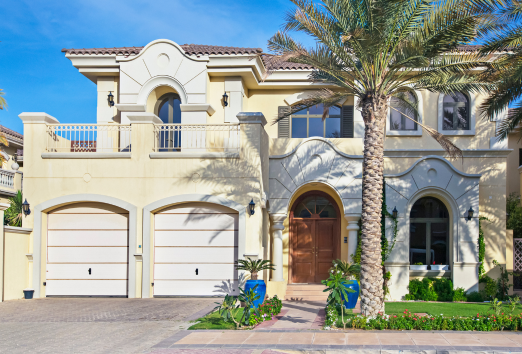By Sakani
What to look for when buying a home in Dubai

Buying a home in Dubai is an exciting yet complex process. Whether you're a first-time buyer or a seasoned investor, understanding what to look for is key to making a sound investment. Dubai offers a variety of property options, from luxurious villas to modern apartments, but the right property for you depends on a combination of factors. Here’s a guide on what to consider before making a purchase.
1. Location
Dubai’s property market is diverse, with different areas catering to various lifestyles. When deciding on a location, consider the following:
Proximity to Work: Areas like Dubai Marina, Downtown, and Business Bay are ideal for those working in the city center. For quieter, family-friendly living, communities like Arabian Ranches or The Springs are great options.
Transportation and Connectivity: Look for properties near major roads and public transport links, such as the Dubai Metro, especially if commuting is part of your daily routine.
Lifestyle Amenities: Consider the area’s proximity to schools, hospitals, shopping malls, parks, and recreational facilities. The availability of these amenities can significantly improve your quality of life.
2. Budget and Financing Options
Dubai’s real estate market offers a range of properties at various price points. Establish your budget first and then look for properties that fall within it. Consider these factors:
Deposit Requirements: For expatriates, banks in Dubai typically require a 25% down payment for property purchases. However, this can be higher for non-residents or if you’re buying a second home.
Mortgage Eligibility: Banks offer mortgages to UAE residents and expatriates, but your eligibility will depend on factors such as your income and credit score. Ensure that you understand the loan terms and associated fees.
Ongoing Costs: Don’t forget about maintenance fees, service charges, and utility bills. Some areas, like Downtown Dubai or Palm Jumeirah, may have higher service charges compared to suburban areas.
3. Type of Property
Dubai offers various types of properties, each with its own set of advantages:
Apartments: Ideal for individuals or couples who prefer a low-maintenance lifestyle. They’re often located in high-demand areas like Dubai Marina or Jumeirah Beach Residence.
Villas and Townhouses: Perfect for families, these properties offer more space and privacy. Popular areas for villas include Arabian Ranches, Al Barari, and Dubai Hills Estate.
Off-Plan Properties: If you're open to waiting, off-plan properties might offer a good investment opportunity. They often come at lower prices and can appreciate significantly by the time they’re ready for occupancy. However, do your due diligence on the developer's reputation.
4. Developer’s Reputation and Property Condition
Research the developer of the property you’re considering. Dubai is home to several established developers like Emaar, Damac, and Nakheel. A reputable developer is more likely to deliver quality properties on time. If you’re buying an older property, ensure it has been well-maintained. Check the condition of common areas, the exterior, and any amenities to avoid unexpected costs for repairs.
5. Legal and Ownership Rights
Understanding the legal aspects of property ownership in Dubai is crucial, especially for expatriates:
Freehold vs. Leasehold: Foreigners can own property in designated freehold areas, while leasehold properties can only be owned by UAE nationals. Make sure you’re purchasing a freehold property if you're planning on full ownership.
Title Deed and Ownership Documents: Ensure the property has clear legal title and is free from encumbrances. It’s essential to verify the seller’s title deed and ensure it matches the property’s details.
RERA Registration: The Real Estate Regulatory Agency (RERA) is the governing body that ensures transparency and fairness in the Dubai property market. Ensure the property is registered with RERA, which guarantees that the seller has all necessary permits to sell.
6. Future Development in the Area
Dubai is a rapidly developing city, and future infrastructure projects can greatly affect the value of your property. Look into upcoming developments in the area, such as new metro lines, malls, or residential communities. These projects can either enhance the value of your property or lead to potential noise and congestion.
7. Return on Investment (ROI)
If you’re purchasing a property as an investment, consider the potential ROI. Some areas in Dubai offer higher rental yields due to demand, such as Dubai Marina, Jumeirah Village Circle, and Business Bay. Ensure that the rental demand in the area aligns with your investment goals. You’ll also want to take into account potential vacancies, property maintenance, and management fees when calculating your ROI.
8. Community and Surroundings
Dubai is known for its master-planned communities, which offer not only homes but a lifestyle. Some areas, like Dubai Hills Estate, feature golf courses and green spaces, while others like City Walk or Jumeirah Beach offer a vibrant urban lifestyle. Research the community vibe and determine whether it aligns with your personal preferences.
9. Property Resale Value
Even if you plan to stay in the property long-term, it’s important to consider its resale value. Properties in prime locations with high demand tend to appreciate over time, making them easier to sell if you ever need to relocate. Always think about how the property fits into the broader market trends.
10. Expert Guidance
Lastly, enlisting a trusted real estate agent can help guide you through the process. An experienced agent will provide valuable insights, help you understand the market, and ensure that your interests are protected. It’s also recommended to work with a legal expert who can review contracts and documentation.
Conclusion
Buying a home in Dubai can be a rewarding experience if you approach the process thoughtfully. By considering factors like location, budget, property type, legal rights, and future market trends, you can ensure that your investment aligns with your long-term goals. Whether you’re looking for a family home or an investment property, thorough research and professional guidance are essential to making a well-informed decision.